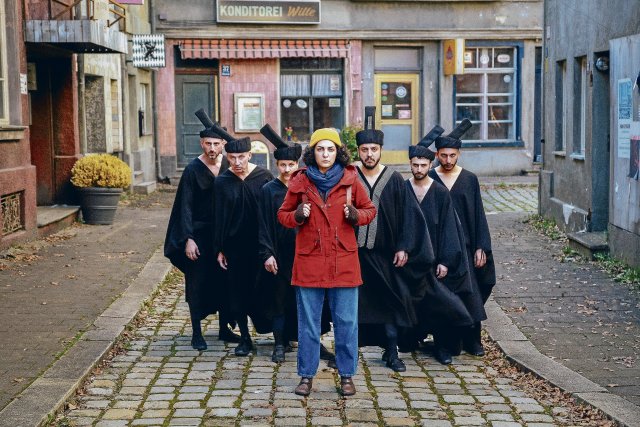Iranian officials in tow: Even in the small Bavarian town, Narges Kalhor (played by Baharak Abdolifard) cannot escape her past.
Photo: Leonie Huber
The hook for your film is that you want to get rid of your second surname “Shahid,” which means “martyr” in German. Why?
I left Iran more than 14 years ago and applied for political asylum here in Germany. Even before that, I actually had no contact with my father, who was the cultural advisor to the then Iranian President Mahmoud Ahmadinejad. My parents were separated. But I inherited the last name from his side. And the rulers he represents are still in power there today. These big, dark shadows of the past still accompany me today, although I will no longer return to Iran and have always openly expressed my political stance then and now. The only thing that symbolically reflects my past every day is my last name. Ultimately, leaving out a few letters doesn’t change the facts. But I wanted to create an approach in this way to tell a story. Because I’m sure I’m not the only one who has a problem with their origins.
INTERVIEW

Narges Kalhor
Narges Kalhor was born in Tehran in 1984 and grew up there. During her studies at the Tehran Film School, she was supervised by well-known filmmakers such as Abbas Kiarostami. In 2009, she applied for political asylum during a visit to Germany, which attracted international attention because she is the daughter of then-Iranian President Ahmadinejad’s highest-ranking cultural adviser. After her application was accepted, she studied at the Munich University of Television and Film. Her graduation film “In the Name of Scheherazade or the first beer garden in Tehran” was awarded the Goethe Institute Prize for the best documentary at the DOK Leipzig film festival in 2019.
In the film, the actress who portrays her applies to a Bavarian district administration for a name change. It turns out that it’s not that easy to get rid of a few letters in Germany …
Yes, it’s quite a journey. Once Iranian, always Iranian. We cannot give up our citizenship – even if we do not have a valid passport. But it is also not possible to have a German and an Iranian passport with two different names. Part of this bureaucratic complex is that it all costs money – and requires a lot of paperwork.
Did it ultimately work?
Unfortunately not. But honestly: no matter whether I change my appearance, my last name or my place of residence, my conflicts with the past are always there. I can’t lie about that. I will have to talk to my child about this when he grows up.
The shadows of the past are very much alive in »Shahid«. In the film, her great-grandfather and “his buddies” follow the character Narges Kalhor through the streets of the small Bavarian town. What do the dancing men with their long robes represent?
It is difficult to visualize how the past impresses and influences us. When we talk about the Middle East and the men in power there, we imagine a group of people dressed in black. I myself am a child of theirs, but I also fled because of them. In the film they follow Narges – and in their comic-like nature you can sometimes take them seriously, sometimes not. They are meant to represent a dragging debt.
Why did you decide to use satirical and comedic means to explore the themes of guilt, escape and asylum?
I used to make sad films, but at some point I learned: life is sad enough, it doesn’t need to be repeated again in the cinema. It’s important to me that the film’s serious messages are understandable, but I wanted to remain casual on another level. I don’t need more sadness, that’s why I’m not making a film. I don’t need any pity from my viewers, I just want to portray this era of my life.
They wander between genres and cross the boundaries of the worlds in front of and behind the camera. You appear again and again as a director with the film team. What meaning do such breaks have for you?
I have been making experimental short films for 20 years and work as an editor. I understood that the most exciting moments in films are the ones we usually cut out. As a female filmmaker, I’m not interested in making perfect films like many male directors do. I take advantage of the ways that great films have been made for a hundred years, but break their rules. I try to tell stories from the background too. This is always an experiment. Sometimes it works, sometimes it goes wrong.
nd.DieWoche – our weekly newsletter
With our weekly newsletter nd.DieWoche look at the most important topics of the week and read them Highlights our Saturday edition on Friday. Get your free subscription here.
What are your next plans?
My new film project, which I’m working on again with Aydin Alinejad, who wrote the script for “Shahid” with me, is about the question of the extent to which we feel free in the West – or rather: Do we value freedom? Is a human rights activist in prison in a non-democratic country with a longing for democracy and freedom perhaps more alive and hopeful than we are here?
When can we expect this film?
“Shahid” cost me four years of my life. So it will probably be a while before the next film comes out. But I’m glad that we now have to worry less about financing because the funders have confidence in us. We want to continue working as a team and with the same producer.
»Shahid«, Germany 2024. Director: Narges Kalhor, script: Narges Kalhor, Aydin Alinejad. With: Baharak Abdolifard, Nima Nazarinia, Narges Kalhor, Thomas Sprekelsen, Carine Huber. 84 mins. Saturday, February 17th, 9:45 p.m., Arsenal; Wednesday, February 21st, 6:15 p.m., Silent Green; Thursday, February 22nd, 6 p.m., Sinema Transtopia.
